Has F.A.S.T. Testing Lived Up to Its Promises?
If you are frustrated with the amount of instructional time wasted by state mandated standardized testing in Florida, this might be a good week to make your concerns known…
On September 14, 2021, Governor DeSantis held a press conference announcing the end of high stakes FSA testing and a move to “customizable” progress monitoring which he promised would result in a 75% decrease in testing time, leaving more time for learning. The transition to the new Florida Assessment of Student Thinking (F.A.S.T.) was introduced with a lot of fanfare.
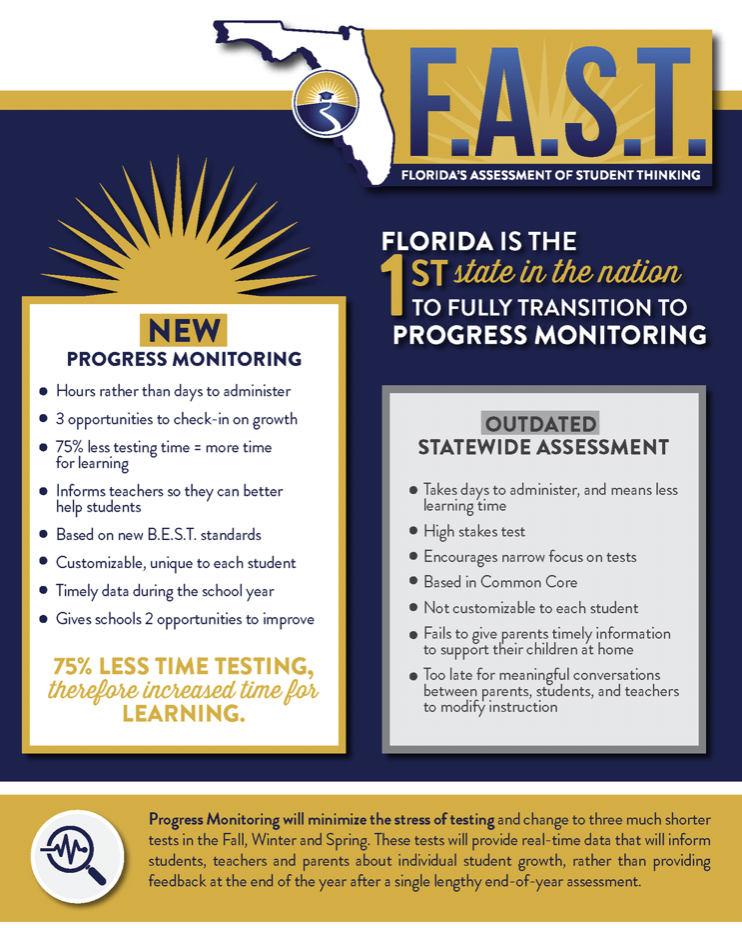
With this transition to statewide progress monitoring for school accountability, DeSantis promised:
- Minimizing the stress of testing to three much shorter tests in the Fall, Winter and Spring that will inform students, teachers and parents about students’ growth, rather than a single lengthy end-of-year assessment that halts learning and leaves zero opportunity for improvement; and
- Reducing testing time an average of 75% through progress monitoring, increasing time for teaching and providing more timely, usable feedback to help students reach their unique goals.
The accompanying bill was filed by then-Senator, now Commissioner of Education, Manny Diaz Jr. (SB1048, 2022) and sailed through committee despite concerns from the public that students would be subjected to more testing and, after the transition year, there would be NO elimination of high stakes testing.
Has F.A.S.T. testing lived up to its promises?
Are Florida’s students and teachers less stressed? Are Florida’s students seeing 75% less testing time and/or more time for learning?
Nope.
The amount of time spent testing has increased. This is a copy of Monroe County’s pre-FAST 2019-2020 Uniform Statewide Assessment Calendar:
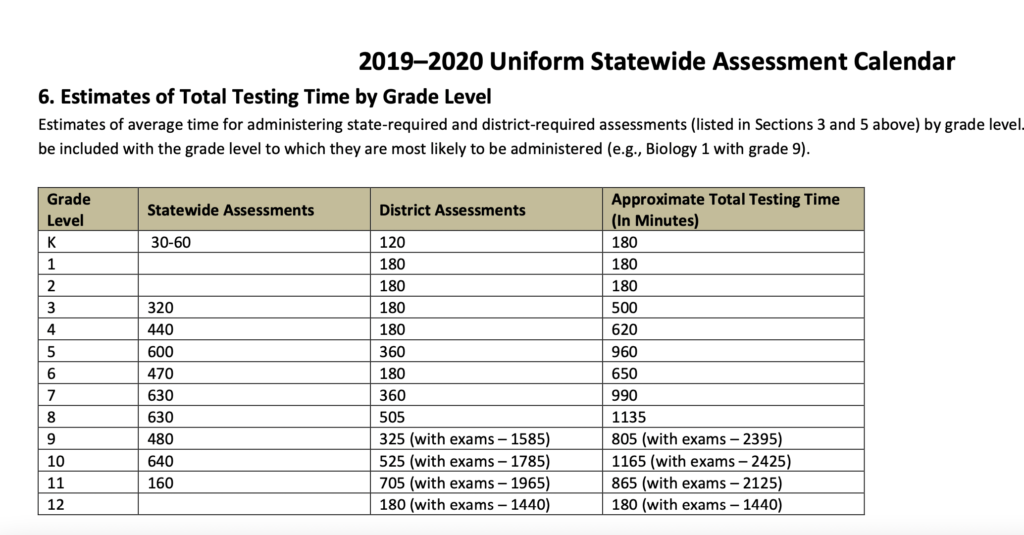
Compare to this year’s 2023-2024 Uniform Statewide Assessment Calendar:
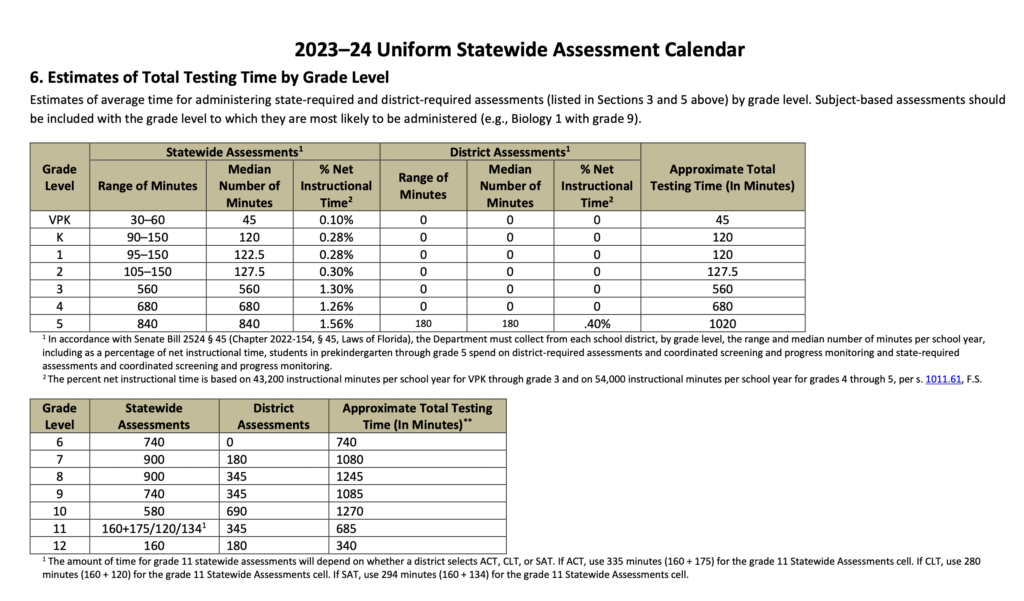
With the transition to F.A.S.T. testing, Monroe has elected to eliminate much of its own progress monitoring this year (a good thing). Look at the state required assessments:
- Testing time is up more than 50%! Total Statewide assessment time went from 4,430 minutes (74 hours) required for students in Kindergarten and grades 3-11 to 6,770 minutes (112 hrs) for grades VPK thru 12. [I calculated using the maximum time because this would be the amount of time the assessment would be scheduled for, i.e. the amount of time “not spent learning” but did not include the time spent on the School Day SAT/ACT/CLT. Also, per the FLDOE: “For scheduling purposes, a recommended session length is provided, but students who are still working at the end of that time may be provided the time needed to complete the (progress monitoring) test, up to the end of the school day.” i.e. a student might spend ALL DAY taking one of these progress monitoring tests.]
- We are now testing pre-K students (4 year olds) 3 times a year on a computer. Ugh.
- Kindergarten testing (5 year olds) went from 30-60 minutes to 90-150 minutes (a 150-200% increase in testing time).
- 1st and 2nd grade state testing went from ZERO minutes to 90-150 minutes each year.
- 3rd grade state testing (the MOST stressful testing year due to mandatory test based retention laws) went from 320 minutes to 580 minutes (>80% increase). These children are 8 or 9 years old.
- The only grade to see less state mandated testing time is grade 10, which decreased from 640 minutes in 19/20 to 580 minutes (60 minutes less) in 23/24.
When considering total testing time (state plus district), Monroe’s testing time has decreased by 9.3% (from 10,050 minutes in 2019/20 to 9117.7 minutes this year), but only because this year Monroe decreased its own testing by almost 45%. If your district is continuing to do duplicative progress monitoring, I encourage you to contact your local school board.
Additional Disruptions due to F.A.S.T. testing:
Teachers know that the amount of time taken away from classroom learning exceed the amount of time scheduled for testing.
- F.A.S.T. assessments are computer based and require similar test security to the old year end tests. This often means a trip to the computer lab, meaning the entire elementary school cannot test at once (as was done with paper testing).
- The time required for the F.A.S.T. progress monitoring assessments (80-100 minutes for grades 3-10) exceeds a single class period so scheduling high school and middle school assessments becomes a scheduling nightmare, where non-tested students from one grade level may be placed in a “holding period” to allow for testing of their classmates from another grade level. During the week of progress monitoring, some high schools hold few actual classes to accommodate the testing schedule.
- As above, students may spend all day taking a progress monitoring test. if needed to complete the test.
For the record, there have been no decreases in high stakes! In fact, last session, the legislature passed HB1537 which INCREASED the stakes for 3rd grade reading assessments by double counting them in the school grade calculation. In addition, there has been no official clarification regarding how the progress monitoring data will be used to assess teachers and schools, which adds significantly to the stress surrounding these assessments.
WHAT’S NEXT?
The F.A.S.T. assessment cut scores, which will determine the passing levels, must be determined and approved by the State Board of Education (FLBOE).
On September 1, 2023, Commissioner Diaz submitted his recommended cut scores to the Legislature in anticipation of FLBOE approval at their upcoming 10/18/23 board meeting in Orlando. Commissioner Diaz believes his cut scores will provide Florida’s students “the best opportunity they have ever had to take control of their academic journey.”
“Florida is setting the bar higher than it ever has before – once again proving this Administration’s commitment to Florida’s students being ready to have a great job, a successful career and pick the best path that suits their dreams.”
https://www.fldoe.org/newsroom/latest-news/florida-department-of-education-submits-historically-significant-standards-for-students-to-ensure-florida-continues-to-move-forward-in-education.stml
Here are the Commissioner’s Recommended ELA/Reading Cut Scores:
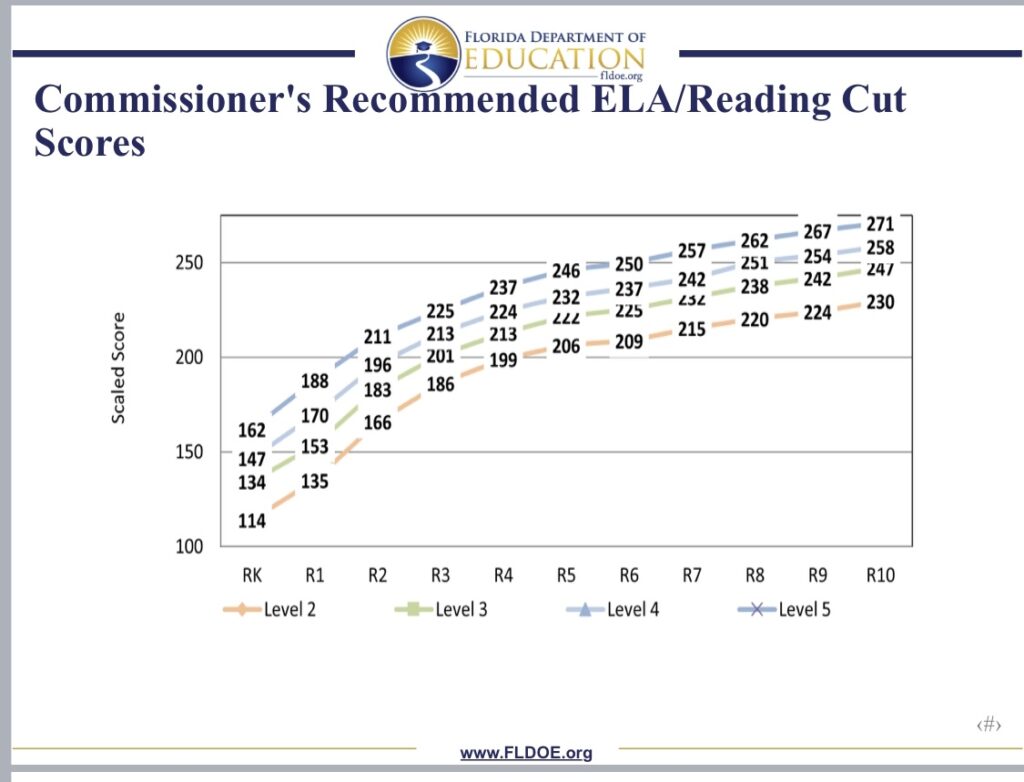
Notice, the cut scores have been set so that 25% of 3rd graders will score a Level 1 and be placed at risk of mandatory retention:
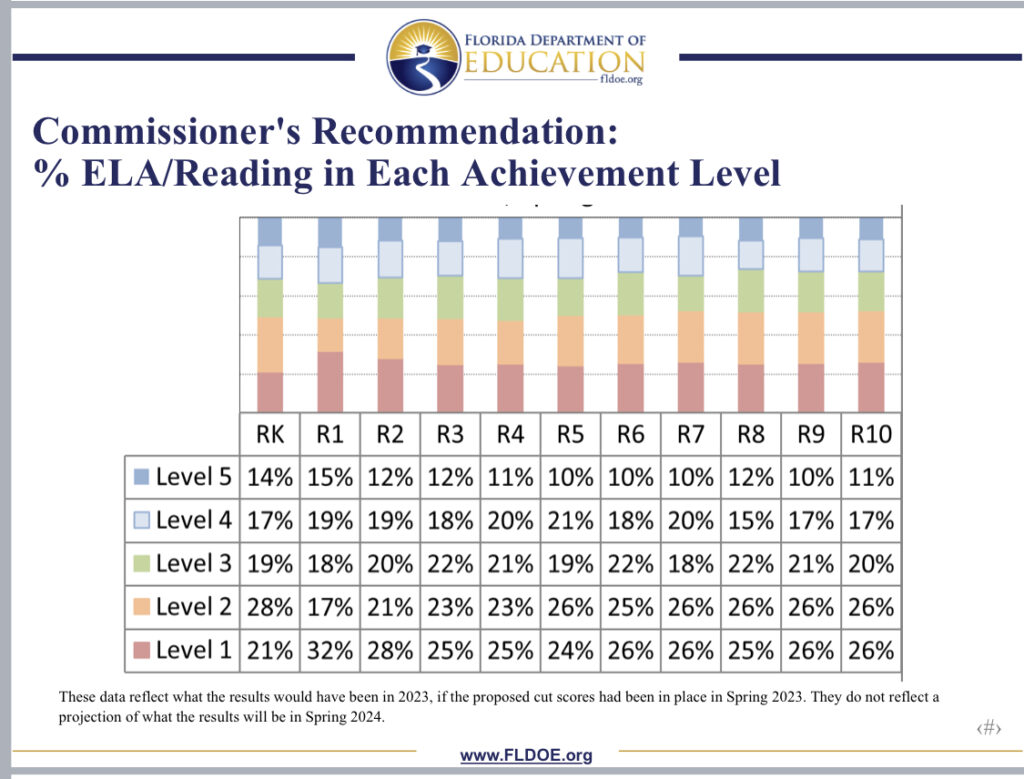
I have questions.
- Have these scores been compared to a nationally normed assessments, ensuring that students reading at grade level will pass the test?
- Have the assessments been shown to be fair and reliable for all students, including our most vulnerable populations?
- Have the assessments been show to be valid for the proposed uses (individual performance, teacher evaluation, school grades)?
- Have the assessments been shown to be fair, valid and reliable for use as both progress monitoring and the federally required year end summative assessment?
- Are these assessments adaptive? Can they adequately inform families regarding student performance well above or well below their grade level?
On Tuesday, October 10, 2023, Juan Copa, from the Florida Department of Education’s Division of Accountability will formally present “Recommended Cut Scores” for the F.A.S.T. assessments to the Senate Education Pre-K-12 Committee. You can watch the meeting on The Florida Channel.
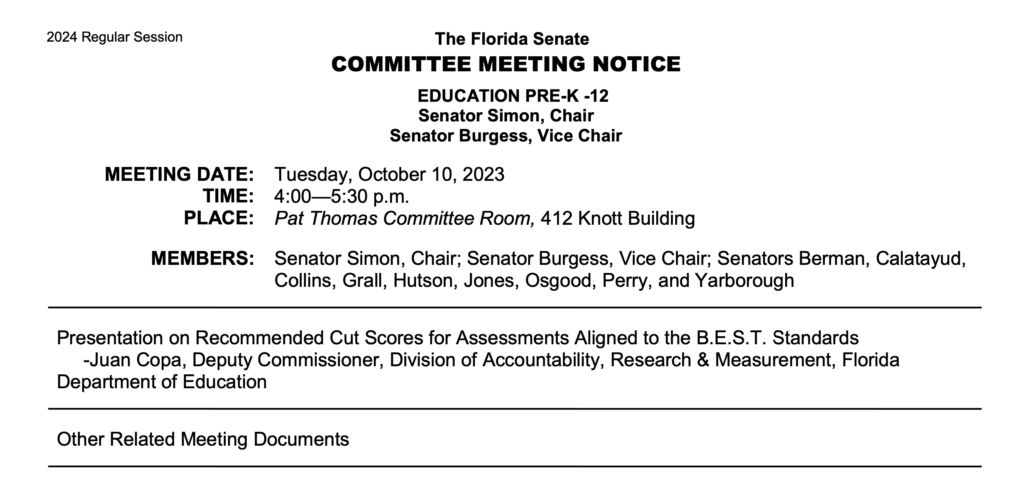
This is a good time to CONTACT THE SENATE EDUCATION COMMITTEE members, before their meeting, with your questions and concerns about F.A.S.T. testing. (Find their contact information here.) Share your child’s experience. Are you actually seeing less time spent testing and more time for learning in the classroom, as promised? Are you satisfied with the quality of information provided in the FAST score reports? Have your children been less stressed by testing this year?
In addition, please ask the committee to determine whether the F.A.S.T. assessments are valid, fair and reliable for all students, including our most vulnerable populations. Are the cut scores consistent with nationally normed grade level determinations? Can they provide useful information for students performing well above or well below grade level?
While you are at it, the State Board of Education is currently asking for public input regarding the new cut scores, Rule 6A-1.09422. You can provide feedback, which will be share with the Commissioner and the FLBOE, on the 2023 B.E.S.T. Standard Setting Public Input Survey.
Finally, if you will be near Orlando on 10/18/23, consider attending a giving public comment at the State Board of Education meeting (held in conjunction with the state charter school convention… yes, really.), where the Commissioner’s cut scores will be rubber stamped/approved.


This testing is burdensome and stressful for students-and serves no useful purpose at all.